It's time for Animaniacs. And I mean that literally.

What is it?
Animaniacs is a series that revolves around an eclectic group of animated characters who are put into hilarious situations. It employs a lot of the same Vaudevillian humor that punctuated much of the classic Looney Tunes, and was made by Warner Brothers, in connection with Steven Spielberg's Amblin Entertainment group.
It's something of a love letter to the classic animated shorts of yesteryear, but it didn't stop there. Not only was the humor of Looney Tunes modernized and given new life, it was actually surpassed by the level of effort, excellent writing, top-notch music, and comedic timing that has secured Animaniacs' place as one of the greatest animated shows of all time.
Where did it come from?
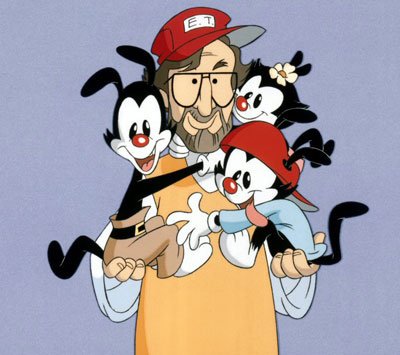
It was the 1990s, and Steven Spielberg was the biggest name in entertainment. After directing a reliable relay of blockbuster after blockbuster, it seemed there was nothing he couldn't do. Studio executives and other assorted people in suits threw themselves at his feet, begging for the chance to turn any of his ideas into reality.
It was a pretty sweet deal for any creative person. We all have to ask ourselves, at some point, what we would do with such power.
Maybe we could end world hunger, or save an endangered species, or devise new technologies that would fix world hunger.
Or maybe we could use it to give people a chance to make cartoons.
Being a fan of the original Looney Tunes shorts, Spielberg was interested in the idea of a revival, of sorts, of their colorful brand of comedy. He set about to create a show that recaptured that nostalgic glow, making himself executive producer of the effort, but handing off creative control to a group of trusted colleagues and employees.
Through their combined efforts, they created an animated show that continued the legacy of Looney Tunes and reengineered it for a modern age. And that show's name was...Tiny Toon Adventures.
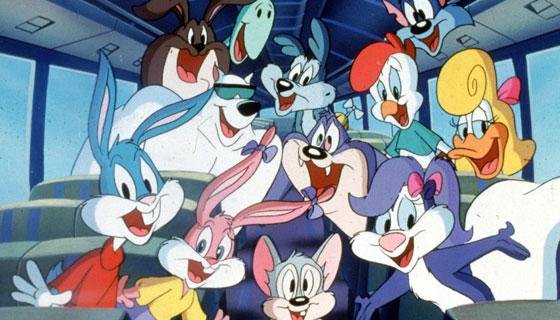
Tiny Toons was a direct continuation of the Looney Tunes brand. It featured adolescent equivalents of all the Looney Tunes characters. The show's premise revolved around the idea that this new generation of toons was going to a school run by the previous generation, where they would learn how to be proper cartoon characters.
Now, anyone who remembers Tiny Toons knows how good a show it was. It won its share of emmys and had a number of extremely memorable episodes.
However, when taken as a whole, this show had a highly noticeable shortcoming: it was tooled entirely towards children. Many of the plots were little more than morality plays, meant to educate first and entertain second. The characters were just as much interested in being cool and hip as they were in being funny (because this was the 90s, after all). And, ultimately, Tiny Toons took the trophy for "Best of Attempts", with particular emphasis on the "attempt" part.
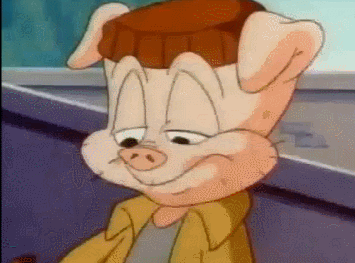
And it seems like the creators were aware of this fact, as well. The show's successor was already prepped to replace it before the plug was pulled on Tiny Toons.
Luckily for us, that successor was Animaniacs, and it would take us to even greater heights.
What Animaniacs did Differently

In a lot of ways, I have to hand it to the creative minds at Warner and Amblin. They possessed the intellect and maturity to learn from their own mistakes, cut out what wasn't working, and start over.
Tiny Toons was the prototype, and Animaniacs was the finished product, and boy did it deliver.
The show's greatest success was that it catered to a more general audience, and the humor in it was meant to be got by adults, which you might think would turn kids off of the show, but the opposite turned out to be true. For years, children had been treated like creatures lacking an intellect, so when they finally were given an entertainment choice that recognized how adult they already were (because kids are so much more intelligent than we give them credit for).
And this was the first time since the death of Looney Tunes that anyone had done this. When it finally, happened, it was like a dam breaking, and studios began to realize that in order to make hit entertainment for children, you need to give their parents a reason to watch.
Without Animaniacs, there could have been no Shrek, no The LEGO Movie, and even no Tangled and Frozen. That's how far reaching this show's impact has been. And it was desperately needed at the time.
Gone were the attempts to be hip, as well as the spoon-fed moralizing. Granted, even Animaniacs had a few network-mandated "very special episodes", but these were all engineered to deliver the biggest emotion imaginable, and deliver their propaganda with as light a touch as they could get away with. They were so liberated from the idea of moralizing that they actually poked fun at the concept with a recurring segment called "The Wheel of Morality".
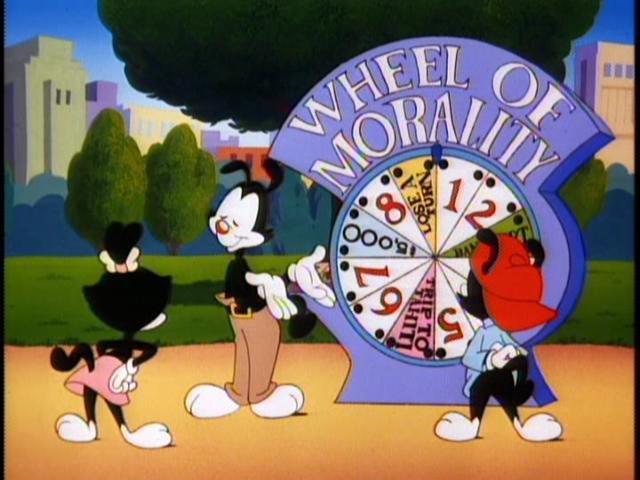
A parody of Wheel of Fortune, the Wheel of Morality would deliver a randomly selected moral at the end of some (not all) episodes. The moral in question would never have anything to do with the skits shown during the episode, and was usually mocked with a quick jibe afterward. But it's presence allowed the show to fit the quota for moral lessons imposed by the network, all while playing with fire.
And It wasn't just Comedy
Speaking of fire, the show also featured this little guy.

The candle flame was one of many side characters who presided over segments that were more dramatic than humorous, as Animaniacs was not content to serve the audience laughter alone.
This show may have been made by Warner Studios, but there were moments when it channeled Disney more than Warner Bros. A number of one-off shorts that were meant to be dramatic and tragic found there way into the lineup, and these were often akin to classic Disney animated briefs, such as "The Little House".
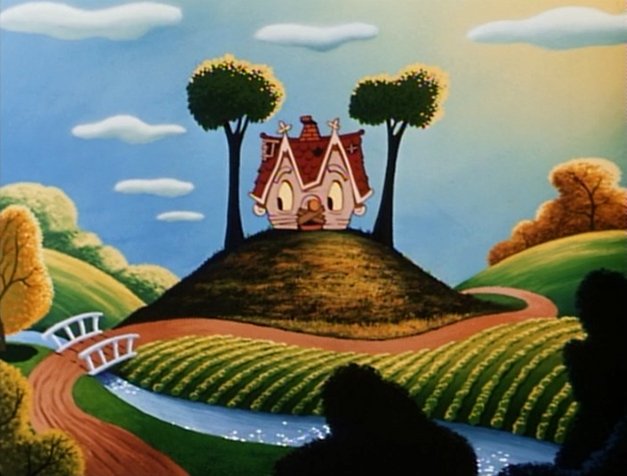
One such segment, involving a sentient piece of wrapping paper who faces the tragedy of being thrown away, was particularly poignant, and the narrator of that segment sounds identical to the voice actor who narrated "The Little House."

And that's what makes this show so enduring and so timeless: Animaniacs has endless variety. You're going to love a lot of it no matter what your tastes are.
But perhaps it would still be wise to revisit the main attractions.
Who are the Animaniacs?
Yakko, Wakko, and Dot
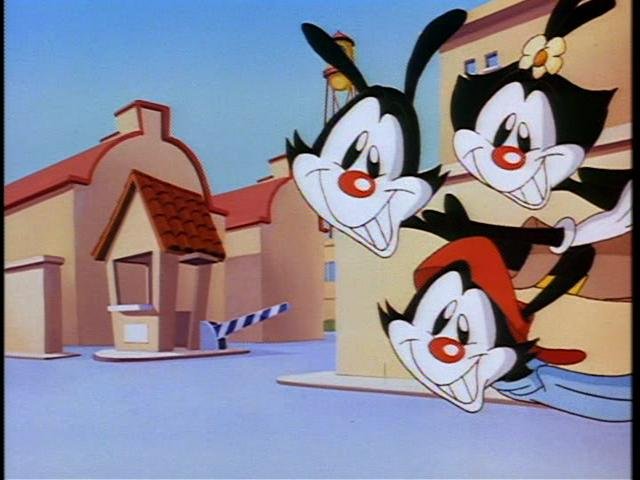
The central trio of the show, these siblings claim to be the Warner Brothers (and the Warner Sister) for whom the production company is named.
Their central conceit is that they are petulant children who always get what they want, and don't care how much devastation they wreak in their obsessive quest to have fun. Many of their victims are fully deserving of a little humility, and, as such, we sympathize with the Warners more than their enemies. But that is not true of all their victims. More than a little of their humor derives from how horrifying they can be. The Warners are three Eric Cartmans---except only 10% as whiny and wielding godlike cartoon powers.
Pinky and the Brain

This pair of lab mice is the second incarnation of Wyle E. Coyote. The principle difference being that instead of obsessing over a road runner, their sole drive and purpose is to take over the entire world. That they will fail to accomplish this design is never in question. The humor comes from how they fail, as well as their inability to escape each other, despite Brain's eternal resentment of Pinky and Pinky's crushed feelings at the hands of Brain.
Their humor was tooled more towards adults than any of the show's other characters, and it worked so well that they eventually got their own spinoff show, as well as a spinoff from that spinoff.
Every moment with these two is golden. The tension between them is so tirelessly tight that it can't help but be funny, especially during those times when they come within inches of their goal. If the key to humor is pain, then Pinky and the Brain is perfection.
Slappy Squirrel

Boy, did this one come out of left field. As far as I can tell, Slappy Squirrel has no analog in the original Looney Tunes, or any other animated show. Her closest relative is Sophia Petrillo from The Golden Girls, except that this Sophia is packing dynamite, and lots of it.
That's pretty much all she does, and that's pretty much all she needs to do, because just putting her on screen is enough to make the entire episode funny. She's too old to care about being a nice person anymore, so when she is put into any ordinary situation where people have to keep a lid on their feelings to function in society, she blows it to explosive extremes. I am so sad that they are not making Slappy Squirrel cartoons anymore---more so than with any other Animaniacs character.
Her foil is Skippy, a chipper young squirrel who is apparently her nephew. Another interesting fact is that Slappy claims to be one of the original Looney Tunes, now retired, but convinced that the world has forgotten how to make great comedy like it used to.
Chicken Boo
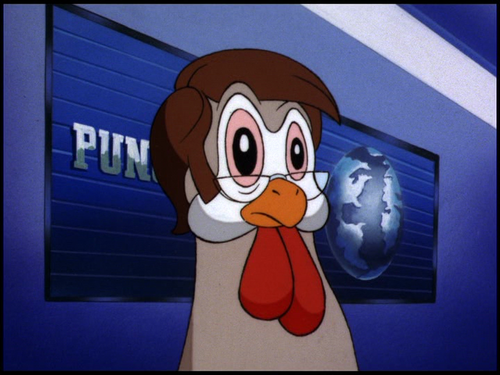
I don't have enough time to mention everyone else, but a special shout out needs to be made for this guy.
Every Chicken Boo cartoon is exactly the same. And I am okay with that.
The fact that they make no sense, and give no explanation for who this chicken is or why he constantly disguises himself as a human in various contexts, is not a problem. Chicken Boo is hilarious, and he will never get old.
The Rest of the Ensemble

Dr. Scratchansniff, Hello Nurse, Minerva Mink, Katie Kaboom, Mindy and Buttons, the Goodfeathers, and a million others. This show has more characters than the universe has atoms. And they all deserve a special place in your heart.
There are also countless one-off characters, who appear in a single segment (often as the main protagonist of that segment) and then never appear again. And they are treasures, every one of them.
And again, there are the sub-segments, which are not full stories but are still too funny to believe. "Good Idea, Bad Idea", "Mime Time", "Useless Facts", and "The Wheel of Morality", to name a few. It's no use trying to tell you about them. You have to see it all yourself.
My Judgment
Animaniacs gets an A+. It deserves no less.
The variety and scope, the explosive right turns, and the perfect comedic timing will forever cement this show as the true heir of Looney Tunes while also transcending and surpassing its predecessor. Its cancellation was unfair and idiotic. We need more of it in the world today.
Every episode of the main series is now on Netflix. Don't pass them up. Watch them with your children, please. No childhood should be without it.
Previous entries in the Netflixing series:
TV Shows
Movies
